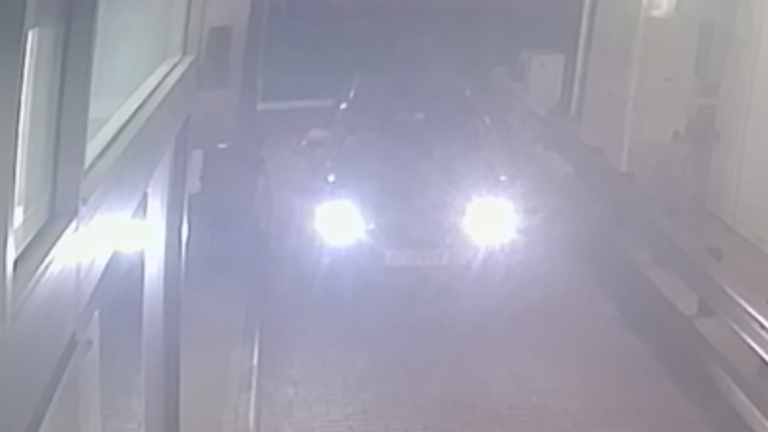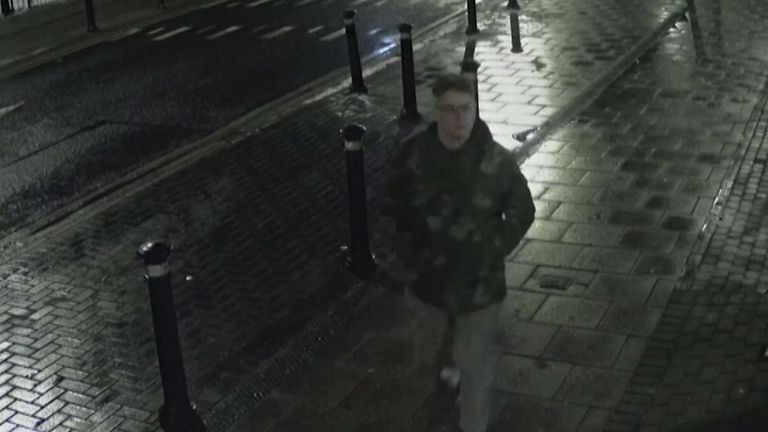After Amy Hart appeared on Love Island, men started sending her unsolicited pictures of their penises online.
As her social media following grew to one million after being on the show in 2019, she says she was consistently tagged in ‘dick pics’.
“You’re flicking through the Instagram stories you’ve been tagged in and they just pop up,” the 31-year-old tells Sky News.
“These people tag loads of women in the public eye so they can say ‘this list of people have all seen my penis’.”
Journalist Sophie Gallagher received 120 images of a stranger’s erect penis via her iPhone’s AirDrop function while she was travelling on the London Underground in 2017.
Despite turning the Bluetooth settings off, having campaigned on the issue ever since, she now receives similar images on social media and by email.
“This is by no means unique to me,” the 32-year-old says. “Anyone in the public eye – celebrities, politicians – are bombarded with it constantly.”
Cyber flashing became a criminal offence in England when the Online Safety Act was passed on 31 January this year.
Today a man is due to be sentenced for it in England for the first time. It has been an offence in Scotland since 2009.
Nicholas Hawkes, 39, from Basildon, Essex, sent unsolicited photos of his erect penis to a woman and a 15-year-old girl on WhatsApp on 9 February and subsequently pleaded guilty to two counts of sending a photograph or film of genitals to cause alarm, distress or humiliation.
‘Forcing women into sexual contact’
Consultant forensic psychologist Kerry Daynes says that men who commit cyber flashing fall into two categories.
“There’s a small group of men who do this as part of a fantasy that the women involved are going to feel aroused by this behaviour,” she says.
“But the vast majority do it as a form of male dominance – as a way of forcing women into a form of sexual contact with them – to cause them distress, shock, horror, or fear.”
Recalling her experience, Sophie says she felt “angry”, which then changed to “shame, guilt and embarrassment”.
“I was embarrassed people might think I was just looking at these pictures on my phone on the tube,” she says.
Professor Clare McGlynn, law professor at Durham University, who helped advise the government on the new law, says both physical indecent exposure and cyber flashing instil the same fear in victims.
“It’s the same harm, the same intimidation, the same fear of what’s going to happen next – it’s just happening in different ways,” she tells Sky News.
She also says that cyber flashing can often prove harder to escape from.
“You can’t get away online. It’s more difficult because our phones are in our hands every day. We need our phones and our laptops for our work, schooling, private lives, banking, shopping, etc.”
But while Professor McGlynn and campaigners say the first sentencing shows “good progress”, prosecutions will still likely be difficult.
Read more:
Cyber flashing on public transport ‘under-reported’
Love Island star says she got death threats from a 13-year-old
In 2023 the law on so-called ‘revenge porn’ was changed so that victims only need to show a lack of consent to their images being shared.
The cyber flashing legislation, however, requires proof that either the perpetrator intended to cause distress, or gain sexual gratification, and was reckless as to whether or not it would cause distress.
Amy says: “The law is great progress, but it needs to go further and become consent-based. Because to me they could just say it was a joke – and then it’s fine.”
Professor McGlynn adds: “It doesn’t make sense, we’ve got two different standards for two very similar offences.
“Sending someone a dick pic without consent should be the offence.
“The reason is that it doesn’t matter what the person was intending, it’s still harmful to you.”
She says the differing legal standard suggests the government “isn’t taking cyber flashing as seriously as it ought to” and “doesn’t recognise it as being as harmful” as sharing people’s intimate images without consent.
‘Short-skirt-drunk-woman argument for new generation’
Amy and Sophie say they have blocked users, deleted photos, and turned off certain settings to avoid seeing unwanted images – but it rarely solves the problem.
Sophie says: “I turn my AirDrop off, that has solved that, but what’s the next thing? Technology is constantly evolving so the next thing will be deepfakes, AI, a new social media platform.
“The argument that we should ‘just stop using social media’ is the short-skirt-drunk-woman argument for a new generation.
“It blames the victim – rather than the perpetrator – and minimises how important our online lives are and the right we have to live safely online.”
Amy adds that there are some men who have threatened to turn up at her home.
Now she lives with her boyfriend and their one-year-old son, she says: “I can’t say where we are and what we’re going to be doing tonight in real time – because it’s not hard to work out where I live.
“Especially now I’ve got a baby – I do feel quite unsafe sometimes.”
Is cyber flashing a ‘gateway’ offence?
Last month a report into the kidnap, rape and murder of Sarah Everard by former police officer Wayne Couzens revealed he had tried to show colleagues violent, extreme pornography and allegedly shared sexually graphic images with young women.
The mother of Libby Squires, who was abducted, raped and murdered by Pawel Relowicz in Hull in 2019, has stressed that he had watched women through windows and broken into their homes to steal intimate items in the weeks before he killed her.
In the cyber flashing case in Essex, the defendant being sentenced today was already a registered sex offender having been convicted of sexual activity with a child under 16 last year.
Ms Daynes says that non-contact sex offences are often a “gateway” to physical, violent crimes.
“Often it’s a gateway offence, or one you see alongside other sexual offending, but sometimes it exists on its own,” she says.
“We’re still trying to figure out who will just operate in the virtual world – and those who will take it offline – for whom simply imagining the reaction of their victim isn’t enough.”
Professor McGlynn argues that while recent cases have “put the spotlight on non-contact offences”, they don’t just serve as ‘gateways’ or ‘red flags’.
“It’s not possible to say one leads to another,” she says. “Individuals offend in lots of ways that overlap, which means you have to take these offences seriously in and of themselves.
“Exposure and cyber flashing are men being intimidating and threatening, so we should take them seriously for that reason – not only because we think they’ll lead to a more ‘major’ offence.”
Platforms need to do more blurring/blocking
All four women say social media platforms need to do more to prevent people from seeing harmful images – both from strangers and people they know.
They fear a “reality-rhetoric gap”, with such a high burden of proof for the new offence, will mean police and the Crown Prosecution Service (CPS) will be reluctant to pursue cases.
Professor McGlynn says the provisions elsewhere in the Online Safety Act have meant regulator Ofcom’s guidance on what platforms should do is “weak”.
“They don’t have to block or blur nude and explicit images because the Online Safety Act is not telling them they have to,” she says. “And that completely misunderstands the harm – the harm is being sent them – just because you can delete them does not make it okay.”
Meta says that on WhatsApp, media sent by anyone not in a user’s contacts is automatically blurred – but this isn’t the case for people users are already connected with.
On Instagram, it says changes have been made to direct message requests so “you can’t receive any images or videos until you’ve accepted their request to chat”.
Apple says there are settings to stop others from seeing a device on AirDrop and sending it content, as well as a ‘sensitive content warning’ option that appears before users can open media that may contain nudity.
Sefer Mani, of the CPS in the East of England, argues the first cyber flashing case from Essex “shows the new law is working” and added: “Cyber-flashing is a grotesque crime. Everyone should feel safe wherever they are. I urge anyone who feels they have been a victim of cyber flashing to report it to the police and know that they will be taken seriously and have their identities protected.”
A government spokesperson added the Online Safety Act is a “deterrent” to cyber flashing, which gives police “the clarity they need to tackle offenders and keep people safe”.
An Ofcom spokesperson said it has proposed “robust measures” for tech firms and is consulting “at pace” on further enforceable changes. It expects to complete its consultation by the end of the year.










